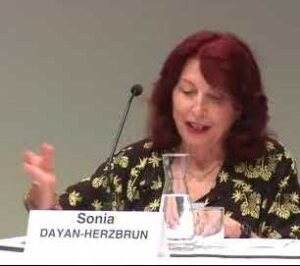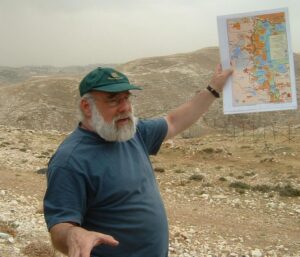We have received feedback from the community, and the main point of contention in our call is the two-state solution. Several individuals signed while expressing reservations about this issue, and others outright refused to sign because of it. It is important to us that we reflect this diversity of views within the community. We have thus asked Professor Sonia Dayan-Herzbrun and Jeff Halper to present their vision of a one-state solution.
Sonia Dayan-Herzbrun is Professor Emeritus of Gender Studies and Political Sociology at University Paris Diderot-Paris 7 and the École des Hautes Études en Sciences Sociales. She is the Editor of Tumultes, President of the NGO Islam et Laïcité, and Vice President of the Association of University Members for the Respect of International Law in Palestine. Her work focuses on social theory, feminism, post-colonialism, and the Middle East. Her latest book is Decolonial Pluriversalism: Epistemes, Aesthetics, and Practices (2025).
The Day After
By Sonia Dayan-Herzbrun
When they attempt to propose political solutions for the period following what they continue to refer to as the “Israeli-Palestinian conflict” or the war between Israel and Hamas, as if these were two equal parties, Western diplomatic offices often revisit the old plan of establishing a Palestinian state alongside the Israeli state. This project seemed reasonable after the 1967 war, when Israel occupied the Palestinian regions previously administered by Jordan (the West Bank and East Jerusalem) and Egypt (Gaza), and annexed the Syrian territory of the Golan Heights. At that time, there was an illusion of restoring to Palestine the political autonomy recognized by the 1947 United Nations General Assembly Resolution 181 and of creating the conditions for what was then called a just and lasting peace.
——Read more-——
Jeff Halper is the head of the Israeli Committee Against House Demolitions (ICAHD) and a founding member of the One Democratic State Campaign. An author and activist, his works include War Against the People: Israel, the Palestinians and Global Pacification (2015), An Israeli in Palestine (2010), Obstacles to Peace (2003), and Redemption and Revival: The Jewish Yishuv in Jerusalem in the Nineteenth Century (1991).
DECOLONIZING ZIONISM, LIBERATING PALESTINE:
TOWARDS ONE DEMOCRATIC STATE
Jeff Halper
One cannot be in a political struggle without a political program, an endgame. If it is to prevail, struggle must be defined by a guiding vision or ideology, a clear political program, organization, leadership and an effective strategy for summoning the power required for achieving its aims. Palestinians once had that. Engaged in an anti-colonial struggle against Zionism and the settler state it created, only one political program made sense: the total liberation of Palestine. Liberation had (and still has for the vast majority of Palestinians) a clear and straightforward meaning: to liberate, to take back their country. Palestine becomes Palestinian again, a Palestinian nation-state in which the nation and its state institutions of governance and control are in the same hands.
—–Read more——


